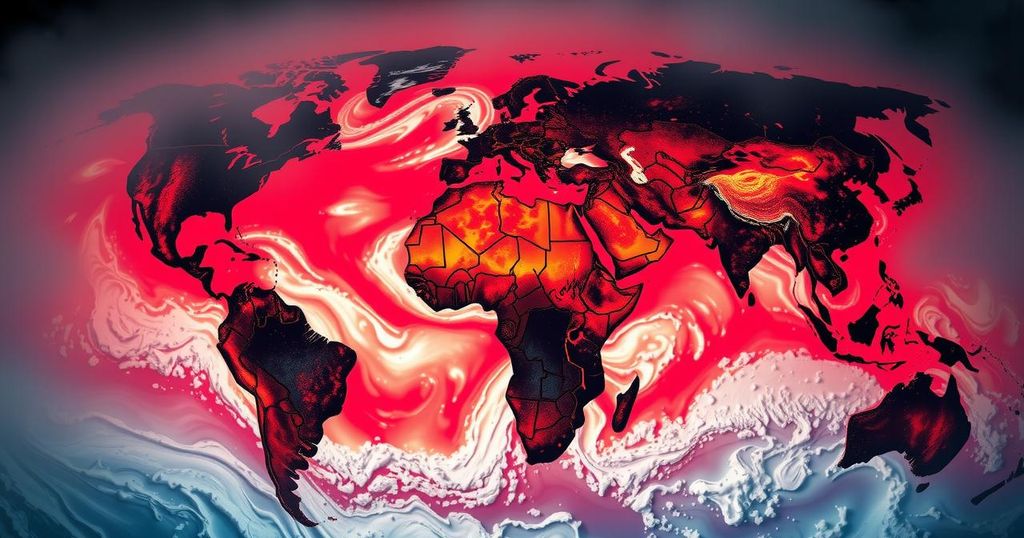Weather
ASIA, BERKELEY EARTH, BERKELEY EARTH TEAM, BRITISH, CALIFORNIA, CLIMATE, COPERNICUS, COPERNICUS CLIMATE SERVICE, EARTH, EUROPE, EUROPEAN COMMISSION, EXTREME WEATHER, GAVIN SCHMIDT, GLOBAL WARMING, GREENHOUSE GAS EMISSIONS, JAPAN, METEOR, NASA, NATIONAL OCEANIC AND ATMOSPHERIC ADMINISTRATION, NO, NORTH AMERICA, SAMANTHA BURGESS, U. S, UNITED KINGDOM, UNITED KINGDOM ' S METEOROLOGY OFFICE, UNITED STATES, WEATHER, WEATHER AGENCY, WILDFIRES, WORLD METEOROLOGICAL ORGANIZATION
Maya Ramirez
0 Comments
2024 Marks Earth’s Hottest Year, Surpassing Emission Thresholds
Earth recorded its hottest year in 2024, surpassing critical climate thresholds established by the Paris Agreement. The global average temperature increased significantly due to greenhouse gas emissions, leading to increased climate-related disasters. Urgent action is needed to mitigate future warming and its dire consequences, including mortality rates, destruction of ecosystems, and rising sea levels.
In a significant climate development, Earth experienced its hottest recorded year in 2024, surpassing critical warming thresholds, according to recent reports from various meteorological agencies. This unprecedented heat, largely attributed to greenhouse gas accumulation from fossil fuel combustion, indicates alarming long-term climate trends, with potential catastrophic consequences, including increased mortality rates, ecosystem destruction, and escalating sea levels. Numerous weather-related disasters, particularly in the United States, further illustrate the urgent need for climate action.
The global average temperature for 2024 exceeded the 1.5 degrees Celsius limit established by the 2015 Paris Agreement, a benchmark that scientists believe must be maintained to avert severe ecological fallout. Measurements revealed that the average temperature was between 1.46 degrees Celsius and 1.62 degrees Celsius higher than pre-industrial levels, underscoring the alarming rate of climate change.
Moreover, the toll of climate-related disasters was evident, with 27 costly events in the U.S. alone during the year, resulting in $182.7 billion in damages, including notable instances of Hurricane Helene. Experts emphasize that these record highs necessitate immediate and significant policy shifts to diminish greenhouse gas emissions and mitigate future temperature rises.
While certain scientists predict a potentially cooler 2025 due to climate phenomena, the current trends indicate a persistent warming trajectory. The warnings from climate scientists are growing increasingly dire, as they highlight that surpassing the 1.5 degrees Celsius threshold, even temporarily, is a severe indicator of the critical state of global climate health.
The increasing temperatures experienced globally can be traced back to the rise in greenhouse gas emissions resulting from the burning of fossil fuels. The 1.5 degrees Celsius threshold was established in the Paris Agreement to limit climate change impacts. Exceeding this limit has significant implications for ecosystems and human health, making it imperative to monitor temperature changes closely. In addition, the phenomenon of extreme weather events, such as hurricanes and wildfires, continues to rise, emphasizing the immediate consequences of prolonged global warming.
In conclusion, the unprecedented heat recorded in 2024 signifies a critical moment in climate science, illustrating the urgent need for global cooperation in addressing climate change. The surpassing of the 1.5 degrees Celsius threshold not only draws attention to the immediate risks faced by societies worldwide but also necessitates a reevaluation of climate policies. Immediate action is essential to reverse the trends of greenhouse gas emissions to avert further environmental degradation and the severe repercussions projected for future generations.
Original Source: www.keranews.org




Post Comment